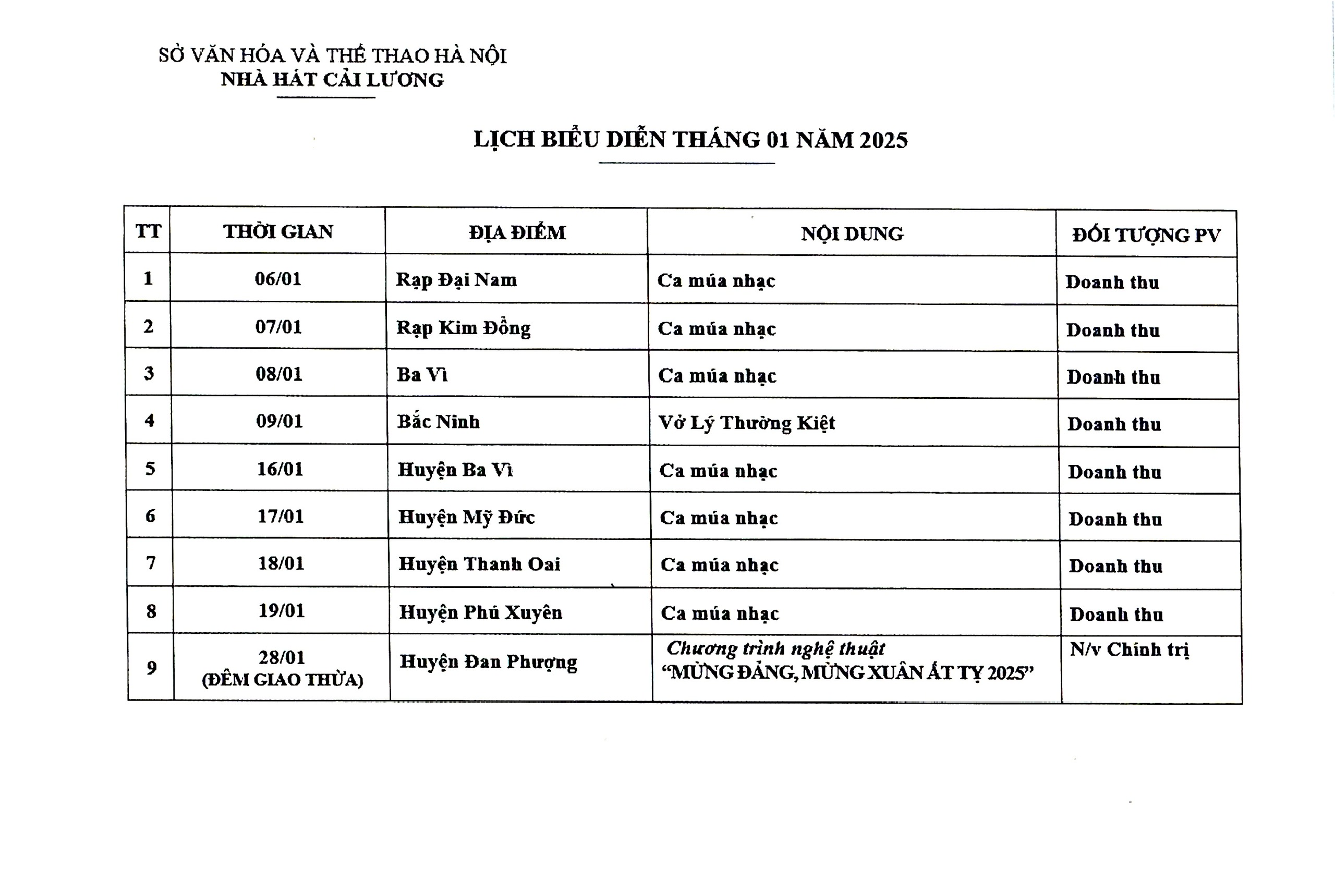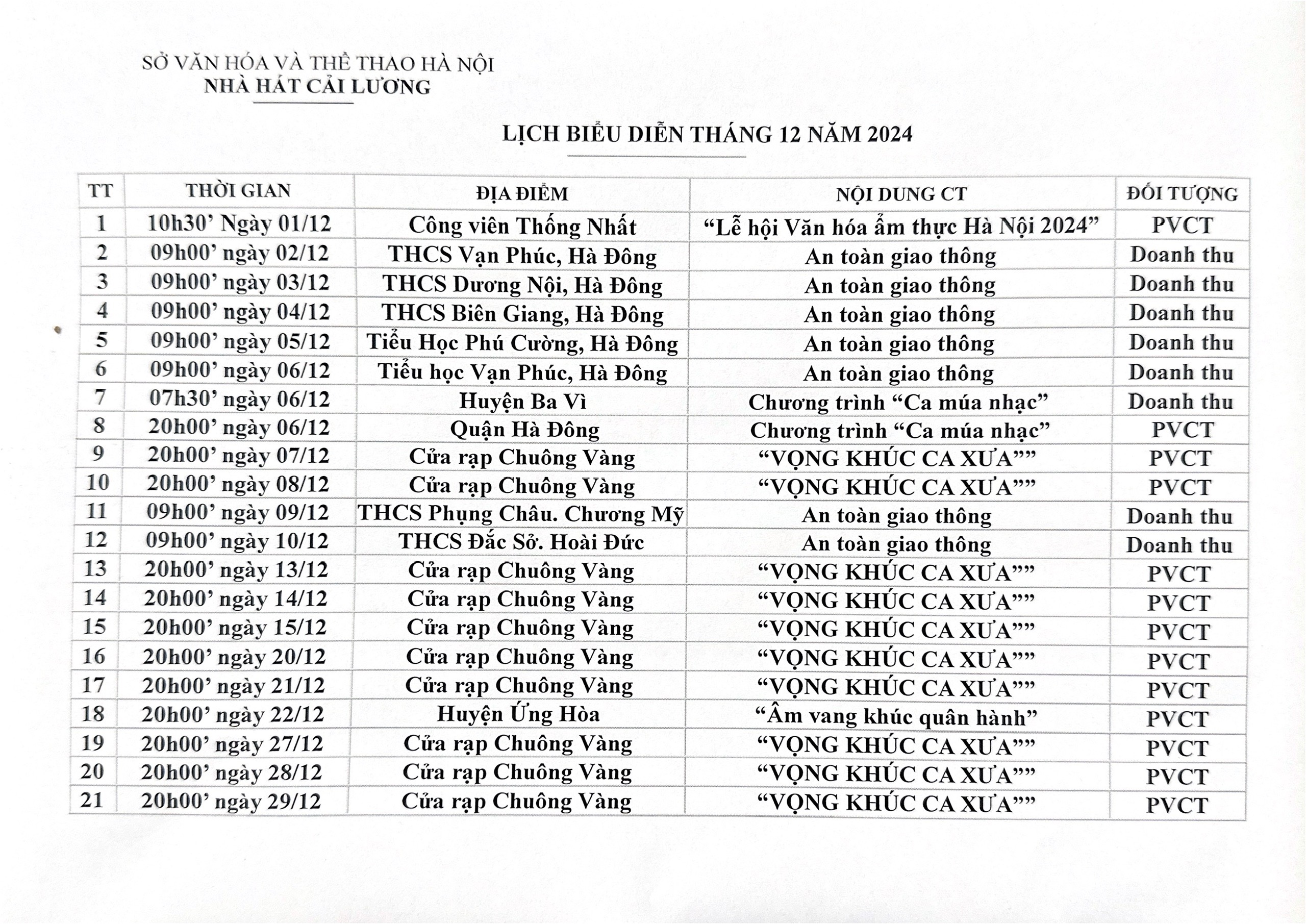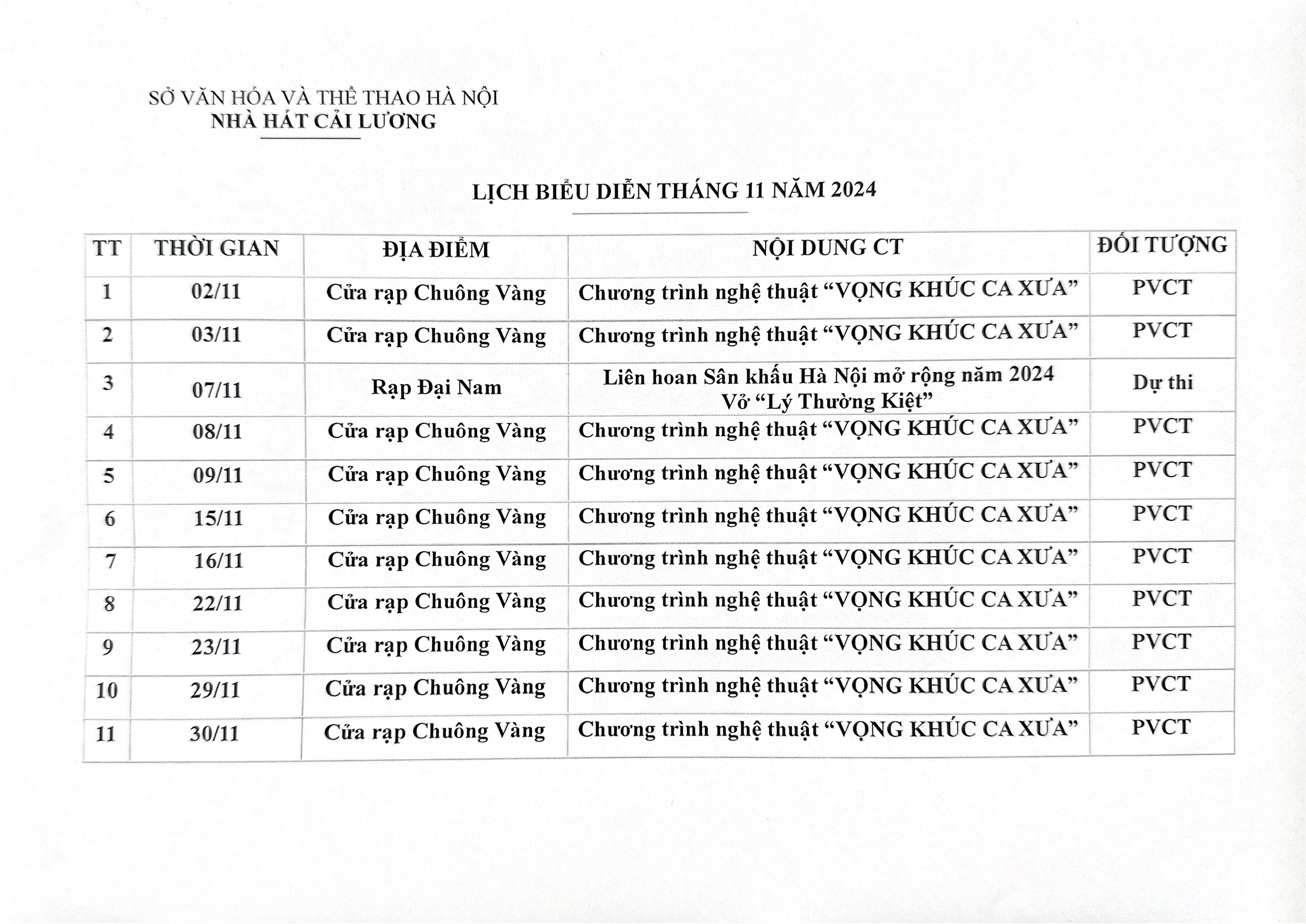 Đồng chí Nguyễn Thị Thanh Hằng – Quận ủy viên – Phó Chủ tịch UBND quận Long Biên tặng hoa chúc mừng chương trình biểu diễn nghệ thuật, đồng chí Nguyễn Quỳnh Chi – Phó Giám đốc Nhà hát Cải lương Hà Nội – đại diện các nghệ sỹ nhận hoa chúc mừng của lãnh đạo quận
Đồng chí Nguyễn Thị Thanh Hằng – Quận ủy viên – Phó Chủ tịch UBND quận Long Biên tặng hoa chúc mừng chương trình biểu diễn nghệ thuật, đồng chí Nguyễn Quỳnh Chi – Phó Giám đốc Nhà hát Cải lương Hà Nội – đại diện các nghệ sỹ nhận hoa chúc mừng của lãnh đạo quận

Thực hiện Thông báo số 246/KH-SVHTT ngày 29/11/2024 của Sở Văn hóa và Thể thao Hà Nội phân công nhiệm vụ biểu diễn nghệ thuật Chào năm mới 2025; Công văn số 5483/SVHTT-QLNT ngày 18/12/2024 của Sở Văn hóa và Thể thao Hà Nội về việc thay đổi địa điểm biểu diễn nghệ thuật Chào năm mới 2025. Tối ngày 31/12/2024, Nhà hát Cải lương Hà Nội phối hợp Phòng Văn hóa và Thông tin quận Long Biên tổ chức biểu diễn chương trình nghệ thuật phục vụ nhân dân tại sân khấu ngoài trời Trung tâm thương mại Tassco Mall.
* Tham dự chương trình có các đồng chí đại diện lãnh đạo quận Long Biên, cùng đông đảo khán giả đến xem và cổ vũ chương trình.
* Tới dự và chỉ đạo chương trình có đồng chí Nguyễn Quỳnh Chi – Phó Giám đốc Nhà hát Cải lương Hà Nội, các cán bộ chủ chốt Nhà hát Cải lương Hà Nội.






* Với chủ đề ca ngợi Đảng Cộng sản Việt Nam quang vinh, ca ngợi Chủ tịch Hồ Chí Minh vĩ đại, ca ngợi lịch sử hào hùng dân tộc Việt Nam và Chào năm mới 2025, ca ngợi tình yêu quê hương đất nước. Chương trình được dàn dựng công phu, nhiều hình thức biểu diễn phong phú với các tiết mục đặc sắc như: Trống hội, Sóng đàn Thăng Long, Niềm tin ngày mới, Đón Xuân, Xuân đẹp làm sao, Hát xẩm: Hà Thành 36 phố phường, Tân cổ: Đêm giao thừa nghe một khúc dân ca, Hát văn: Thăng Long địa linh nhân kiệt, Ca cảnh: Chung sắc mai đào, Hãy vươn cao hơn…..qua phần biểu diễn của các nghệ sĩ, diễn viên: NSND Thanh Hương, NSND Đào Trung, NSUT Hoàng Viện, NSUT Hồng Nhung, NSUT Quang Thanh, NSUT Quang Tuấn, NS Minh Đức, NS Thiên Hương và các nghệ sĩ tài năng: NS Thu Hường, NS Nhật Linh, NS Ngân Hiền, NS Minh Thêm …cùng dàn nhạc và nhóm múa Nhà hát Cải lương Hà Nội ….Chương trình nghệ thuật đã để lại ấn tượng sâu sắc trong lòng khán giả.
Chỉ đạo nghệ thuật: Nhạc sỹ Phạm Chỉnh – Giám đốc Nhà hát Cải lương Hà Nội

 ./.
./.

Thực hiện Thông báo số 246/KH-SVHTT ngày 29/11/2024 của Sở Văn hóa và Thể thao Hà Nội phân công nhiệm vụ biểu diễn nghệ thuật Chào năm mới 2025. Tối ngày 29/12/2024, Nhà hát Cải lương Hà Nội phối hợp Trung tâm Văn hóa – Thông tin và Thể thao huyện Thanh Oai tổ chức biểu diễn chương trình nghệ thuật phục vụ nhân dân tại Sân khấu ngoài trời Chợ Bích Hà, huyện Thanh Oai.



* Tham dự chương trình có các đồng chí đại diện lãnh đạo huyện Thanh Oai, cùng đông đảo khán giả đến xem và cổ vũ chương trình.

* Tới dự và chỉ đạo chương trình có Nhạc sỹ Phạm Chỉnh – Giám đốc Nhà hát Cải lương Hà Nội; các đồng chí trong Ban Giám đốc, cán bộ chủ chốt Nhà hát Cải lương Hà Nội.




* Chương trình được dàn dựng công phu, với sự tham gia biểu diễn của các nghệ sĩ, diễn viên đoàn Hoa Mai – Nhà hát Cải lương Hà Nội: NSUT Quang Thanh, NSUT Thái Vân, NSUT Tuấn An, NS Minh Đức, NS Thiên Hương và các nghệ sĩ trẻ tài năng: …cùng dàn nhạc và nhóm múa Nhà hát Cải lương Hà Nội ….
* Với chủ đề: Ca ngợi Đảng Cộng sản Việt Nam quang vinh, ca ngợi Chủ tịch Hồ Chí Minh vĩ đại, ca ngợi lịch sử hào hùng dân tộc Việt Nam và Chào năm mới 2025, ca ngợi tình yêu quê hương đất nước. Chương trình nghệ thuật đã để lại ấn tượng sâu sắc trong lòng khán giả.
Chỉ đạo nghệ thuật: Nhạc sỹ Phạm Chỉnh – Giám đốc Nhà hát




Được sự đồng ý của Sở Văn hóa và Thể thao Hà Nội, tối ngày 25/12/2024, tại rạp Đại Nam, 89 Phố Huế, Nhà hát Cải lương Hà Nội tổ chức tổng duyệt tác phẩm: “TÌNH SỬ ĐÔNG A
Đến dự buổi tổng duyệt có:
1. NSND Thúy Mùi – Chủ tịch Chủ tịch Hội Nghệ sĩ Sân khấu Việt Nam
2. NSND Quốc Chiêm – Chủ tịch Hội Liên hiệp Văn học Nghệ thuật Hà Nội – Chủ tịch Hội đồng Nghệ thuật Sở và các thành viên Hội đồng nghệ thuật Sở;
3. Đồng chí Đỗ Kim Oanh – Trưởng Phòng Quản lý Nghệ thuật – Sở Văn hóa và Thể thao Hà Nội cùng các đồng chí cán bộ chủ chốt, cán bộ chuyên môn phòng Quản lý Nghệ thuật Sở.
4. Nhạc sỹ Phạm Chỉnh – Giám đốc Nhà hát, cùng các đồng chí trong Ban Giám đốc; Cán bộ chủ chốt các Phòng – Đoàn cùng các cán bộ, nghệ sỹ, công nhân viên Nhà hát.
* Hội đồng Nghệ thuật Sở đánh giá: Tác phẩm ” Tình Sử Đông A “: Đã được dàn dựng đạt chất lượng nghệ thuật cao, đầu tư về đạo cụ, phông cảnh, hiệu ứng âm thanh ánh sáng hỗ trợ tốt cho các phần biểu diễn của nghệ sỹ. Phần thể hiện của các nghệ sỹ đã mang lại ấn tượng sâu sắc cho khán giả. Công tác chuẩn bị và phối hợp chặt chẽ giữa các bộ phận của Nhà hát đã làm nên thành công của buổi tổng duyệt.
Một số hình ảnh:










KHỐI CỘNG TÁC VIÊN
Tác giả kịch bản: NSUT Trịnh Quang Khanh
Chuyển thể Cải lương: Nguyễn Đức Minh
Đạo diễn: NSND Trịnh Thúy Mùi
Âm nhạc: NSUT Tuấn Hải
Họa sĩ: NSND Đạt Tăng
Biên đạo múa: NSUT Hoài Anh
Hướng dẫn Ca hát: NSND Thanh Hương
Trợ lý: NSUT Hồng Nhung
Chỉ huy dàn nhạc: NSND Đào Trung
BẢNG PHÂN VAI
1. Trần Quốc Tuấn: NS Nhật Linh
2. Công chúa Thiên Thành: NSUT Hồng Nhung
3. Vua Trần Thái Tông: NSUT Hoàng Viện
4. Hoàng hậu Thuận Thiên: NSND Thanh Hương
5. Công chúa Thụy Bà: NSUT Kim Dung
6. Trung Thành Vương: NS Hữu Nhân
7. Nhân Đạo Vương: NSUT Quang Tuấn -
8. Thị nữ Tâm Tâm: NS Thu Hường
9. Quan Thái giám: NS Quang Hưng
10. Quận vương Trần Nhật Hiệu: NS Quang Huy
Cùng dàn nhạc, nhóm múa và công nhân viên, kỹ thuật viên Nhà hát.
- Thư ký: NS Thu Hường
- Tổng đài: NS Xuân Hùng
 Thực hiện thông báo số 235/KH-SVHTT ngày 19/11/2024 của Sở Văn hóa và Thể thao Hà Nội phân công nhiệm vụ biểu diễn nghệ thuật chào mừng kỷ niệm 80 năm Ngày thành lập Quân đội nhân dân Việt Nam (22/12/1944 – 22/12/2024) và 35 năm Ngày hội Quốc phòng toàn dân (22/12/1989 – 22/12/2024), tối ngày 20-22/12/2024 Nhà hát Cải lương Hà Nội biểu diễn 02 chương trình nghệ thuật phục vụ nhân dân tại quận Hà Đông và huyện Ứng Hòa.
Thực hiện thông báo số 235/KH-SVHTT ngày 19/11/2024 của Sở Văn hóa và Thể thao Hà Nội phân công nhiệm vụ biểu diễn nghệ thuật chào mừng kỷ niệm 80 năm Ngày thành lập Quân đội nhân dân Việt Nam (22/12/1944 – 22/12/2024) và 35 năm Ngày hội Quốc phòng toàn dân (22/12/1989 – 22/12/2024), tối ngày 20-22/12/2024 Nhà hát Cải lương Hà Nội biểu diễn 02 chương trình nghệ thuật phục vụ nhân dân tại quận Hà Đông và huyện Ứng Hòa.

* Tham dự chương trình có các đồng chí đại diện lãnh đạo quận Hà Đông, huyện Ứng Hòa cùng đông đảo khán giả đến xem và cổ vũ chương trình.
* Tới dự và chỉ đạo chương trình có Nhạc sỹ Phạm Chỉnh – Giám đốc Nhà hát Cải lương Hà Nội; các đồng chí trong Ban Giám đốc, cán bộ chủ chốt Nhà hát Cải lương Hà Nội

* Chương trình được dàn dựng công phu, với sự tham gia biểu diễn của các nghệ sĩ, diễn viên: NSND Thanh Hương, NSND Đào Trung, NSUT Hoàng Viện, NSUT Hồng Nhung, NSUT Quang Thanh, NSUT Quang Tuấn, NS Minh Đức, NS Thiên Hương và các nghệ sĩ tài năng: NS Thu Hường, NS Nhật Linh, NS Ngân Hiền, NS Minh Thêm …cùng dàn nhạc và nhóm múa Nhà hát Cải lương Hà Nội ….



* Với chủ đề: Ca ngợi Đảng Cộng sản Việt Nam quang vinh, ca ngợi Chủ tịch Hồ Chí Minh vĩ đại, ca ngợi 80 năm lịch sử hào hùng của Quân đội nhân dân Việt Nam và 35 năm Ngày Hội Quốc phòng toàn dân, ca ngợi tình yêu quê hương đất nước. Chương trình nghệ thuật đã để lại ấn tượng sâu sắc trong lòng khán giả.
Chỉ đạo nghệ thuật: Nhạc sỹ Phạm Chỉnh – Giám đốc Nhà hát





Sáng ngày 20/11/2024, tại Rạp Chuông Vàng, số 72 Hàng Bạc. Nhà hát Cải lương Hà Nội đã tổ chức Hội nghị Tổng kết khen thưởng: Liên hoan Sân khấu Hà Nội mở rộng năm 2024 và Liên hoan Cải lương toàn quốc năm 2024.
Dự và chỉ đạo Hội nghị: Nhạc sỹ Phạm Chỉnh – Bí thư Chi bộ – Giám đốc Nhà hát.
Cùng các đồng chí trong Chi ủy, Ban Giám đốc, cán bộ chủ chốt cùng toàn thể nghệ sỹ, công nhân viên, kỹ thuật viên Nhà hát.
Nhạc sỹ Phạm Chỉnh đánh giá kết quả đạt được của Nhà hát qua 02 cuộc Liên hoan, đề nghị toàn thể đơn vị tiếp tục phát huy ưu điểm, khắc phục một số hạn chế, đồng thời khen thưởng các tập thể, cá nhân đạt thành tích cao và có đóng góp tại 02 cuộc Liên hoan.
I. Liên hoan Sân khấu Hà Nội mở rộng năm 2024
A. GIẢI TẬP THỂ
1. Vở: Lý Thường Kiệt : Huy chương Bạc
B. GIẢI CÁ NHÂN
*. HUY CHƯƠNG VÀNG
1. NSUT Quang Thanh – Đôn Quốc công Thái úy – Lý Thường Kiệt
2. NSUT Tuấn An – Tể chấp đầu triều – Lý Đạo Thành
3. NS Thiên Hương (Đỗ Thị Hương) – Thái hậu – Nguyên phi Ỷ Lan
*. HUY CHƯƠNG BẠC
1. NS Xuân Vương – Hiệu úy Lý Ngân
2. NS Ngân Hiền – Vệ úy Hạnh Hoa
3. NSUT Thái Vân – Hoàng Hậu – Thượng Dương
II. Liên hoan Cải lương toàn quốc năm 2024
A. GIẢI TẬP THỂ
1. Vở: Xuân Hương nữ sĩ: Huy chương Vàng
B. GIẢI CÁ NHÂN
*. HUY CHƯƠNG VÀNG
1. NSND Thanh Hương – Nguyễn Thị Tồn – vở Muôn dặm vì chồng
2. NSUT Hồng Nhung – Phan Khanh – vở Sóng dậy giữa Vương triều
3. NSUT Quang Thanh – Phủ Vĩnh Tường – vở Xuân Hương nữ sĩ
4. NS Thiên Hương (Đỗ Thị Hương) – Hồ Xuân Hương – vở Xuân Hương nữ sĩ
*. HUY CHƯƠNG BẠC
1. NSUT Hoàng Viện – Phan Thanh Giản – vở Muôn dặm vì chồng
2. NS Nhật Linh – Vua Tự Đức – vở Muôn dặm vì chồng
3. NS Quang Huy (Lê Văn Ghi) – Dương Thái Sư – vở Sóng dậy giữa Vương triều
4. NS Hoàng Dân – Bùi Công – vở Sóng dậy giữa Vương triều
5. NSUT Quang Tuấn – Bùi Hữu Nghĩa – vở Muôn dặm vì chồng
6. NSUT Thái Vân – Bà Hai (vợ Tổng Cóc) – vở Xuân Hương nữ sĩ
7. NSUT Tuấn An (Đặng Văn An) - Tổng Cóc – vở Xuân Hương nữ sĩ
III. Nhà hát khen thưởng các tập thể, cá nhân có thành tích
1. Các nghệ sỹ đạt huy chương tại 02 cuộc Liên hoan;
2. Tập thể các đoàn: Chuông Vàng – Kim Phụng – Hoa Mai;
3. Tập thể các phòng: Hành chính – Tổng hợp; Tổ chức Biểu diễn và Nghệ thuật;
4. 02 tổ Nhạc;
5. Đồng chí Kế toán trưởng;
6. Tổ Công nhân kỹ thuật;
7. Tổ Xe;




Hội nghị cũng vinh danh và chúc mừng 02 Nghệ sỹ của đơn vị được Nhà nước phong tặng danh hiệu NSUT: NSUT Hồng Nhung – Trưởng đoàn Chuông Vàng và NSUT Quang Tuấn.

Cũng nhân dịp này, Chi ủy, Ban Giám đốc, Ban Chấp hành Công đoàn Nhà hát đã tri ân và tặng quà chúc mừng Nghệ sỹ Quyết Thắng – Nghệ sỹ Đình Đệ vừa được Nhà nước cho nghỉ hưởng chế độ hưu trí theo quy định.





Nhạc sỹ Phạm Chỉnh đề nghị toàn thể cán bộ, nghệ sỹ, công nhân viên, kỹ thuật viên Nhà hát nâng cao tinh thần đoàn kết hoàn thành thắng lợi các nhiệm vụ còn lại của năm 2024.
Kết thúc hội nghị Nhà hát đã tổ chức buổi liên hoan đầm ấm, chúc mừng thành tích của Nhà hát, các nghệ sỹ đạt giải thưởng và chia tay các nghệ sỹ nghỉ chế độ hưu trí./.


Được sự đồng ý của Sở Văn hóa và Thể thao Hà Nội, Sáng ngày 19/11/2024, tại rạp Chuông Vàng, số 72 Hàng Bạc, Hoàn Kiếm, Nhà hát Cải lương Hà Nội tổ chức Lễ Khởi công tác phẩm: TÌNH SỬ ĐÔNG A.
Đến dự và chỉ đạo có: Nhạc sỹ Phạm Chỉnh – Giám đốc Nhà hát.
Đến dự còn có các đồng chí trong Ban Giám đốc; Cán bộ chủ chốt các Phòng – Đoàn, các thành viên ekip sáng tạo và cán bộ, nghệ sỹ, công nhân viên Nhà hát.
Nhạc sỹ Phạm Chỉnh – Giám đốc Nhà hát cho biết: “Năm 2024 với nhiều ngày lễ lớn, sự kiện lịch sử quan trọng, các nhiệm vụ chuyên môn thường xuyên và đột xuất, toàn thể cán bộ, nghệ sỹ, công nhân viên nhà hát đã đoàn kết, nỗ lực vượt qua khó khăn để hoàn thành xuất sắc các nhiệm vụ được giao. Nhạc sỹ Phạm Chỉnh – Giám đốc Nhà hát đề nghị đơn vị tiếp tục cố gắng, tập trung để luyện tập và tổ chức tổng duyệt theo tiến độ kế hoạch đã được Sở Văn hóa và Thể thao Hà Nội phê duyệt”.
Một số hình ảnh lãnh đạo Nhà hát, cộng tác viên, nghệ sỹ phát biểu ý kiến tại buổi lễ:
 Đ/c Nguyễn Quỳnh Chi – Phó Giám đốc Nhà hát phát biểu ý kiến
Đ/c Nguyễn Quỳnh Chi – Phó Giám đốc Nhà hát phát biểu ý kiến
 NS Minh Đức – Phó trưởng Phòng TCBD&NT phát biểu ý kiến về công tác chuẩn bị, tiến độ tập luyện.
NS Minh Đức – Phó trưởng Phòng TCBD&NT phát biểu ý kiến về công tác chuẩn bị, tiến độ tập luyện.
 Đạo diễn: NSND Trịnh Thúy Mùi phát biểu ý kiến
Đạo diễn: NSND Trịnh Thúy Mùi phát biểu ý kiến
 Tác giả kịch bản: NSUT Trịnh Quang Khanh trao đổi về nội dung kịch bản
Tác giả kịch bản: NSUT Trịnh Quang Khanh trao đổi về nội dung kịch bản
 Nghệ sỹ trẻ Ngân Hiền phát biểu ý kiến nhận nhiệm vụ
Nghệ sỹ trẻ Ngân Hiền phát biểu ý kiến nhận nhiệm vụ

KHỐI CỘNG TÁC VIÊN
Tác giả kịch bản: NSUT Trịnh Quang Khanh
Chuyển thể Cải lương: Nguyễn Đức Minh
Đạo diễn: NSND Trịnh Thúy Mùi
Âm nhạc: NSUT Tuấn Hải
Họa sĩ: NSND Đạt Tăng
Biên đạo múa: NSUT Hoài Anh
Hướng dẫn Ca hát: NSND Thanh Hương
Trợ lý: NSUT Hồng Nhung
BẢNG PHÂN VAI
1. Trần Quốc Tuấn: NS Nhật Linh
2. Công chúa Thiên Thành: NS Ngân Hiền – NSUT Hồng Nhung (Kíp 2)
3. Vua Trần Thái Tông: NSUT Hoàng Viện
4. Hoàng hậu Thuận Thiên: NSUT Hồng Nhung – NSUT Kim Dung (Kíp 2)
5. Công chúa Thụy Bà: NSUT Kim Dung – NS Đan Thanh (Kíp 2)
6. Trung Thành Vương: NS Hữu Nhân
7. Nhân Đạo Vương: NSUT Quang Tuấn – NS Quang Thuyết (Kíp 2)
8. Thị nữ Tâm Tâm: NS Thu Hường (Kíp 2)
9. Quan Thái giám: NS Quang Hưng
10. Quận vương Trần Nhật Hiệu: NS Quang Huy
Cùng nhóm múa và công nhân viên, kỹ thuật viên Nhà hát.
- Thư ký: NS Thu Hường
- Tổng đài: NS Xuân Hùng
Sáng ngày 08/11/2024 tại rạp Chuông Vàng, số 72 Hàng Bạc, Hoàn Kiếm, Hà Nội, Chi bộ Nhà hát Cải lương Hà Nội đã tổ chức sinh hoạt kỳ tháng 11 năm 2024

Nhạc sỹ Phạm Chỉnh – Bí thư Chi bộ Nhà hát chủ trì buổi sinh hoạt.
Tham dự có các đồng chí trong Chi ủy, lãnh đạo và các đảng viên Nhà hát.
Nội dung trọng tâm:
- Đánh giá kết quả hoạt động Chi bộ tháng 10 năm 2024, triển khai hoạt động trọng tâm của Chi bộ tháng 11 năm 2024; phương hướng hoạt động tháng 12 năm 2024.
- Công tác chuyên môn: tiếp tục xây dựng kịch bản trình cấp trên phê duyệt, tổ chức khởi công các vở mới, tổng duyệt theo kế hoạch; Biểu diễn nghệ thuật phục vụ các nhiệm vụ chính trị và doanh thu; tổng duyệt các tác phẩm mới theo kế hoạch.
- Phối hợp các đơn vị đẩy mạnh hoạt động khai thác nghệ thuật tại rạp Chuông Vàng theo quy định.
- Phòng HC-TH; Phòng TCBD&NT tiếp tục tham mưu, triển khai thực hiện các nội dung công việc theo Kế hoạch đã đề ra;
- Chỉ đạo Công đoàn xây dựng kế hoạch, tổ chức thực hiện các nhiệm vụ theo hướng dẫn của Công đoàn cấp trên;
- Chỉ đạo Chi đoàn Đoàn Thanh niên Nhà hát xây dựng kế hoạch hoạt động, tổ chức thực hiện các nhiệm vụ theo hướng dẫn của cấp trên;
- Phương hướng hoạt động Chi bộ tháng 12 năm 2024;
Các ý kiến phát biểu, đóng góp của đảng viên Chi bộ tập trung thống nhất cao với nội dung triển khai của đồng chí Bí thư Chi bộ Nhà hát.
Nghị quyết buổi sinh hoạt được 100% đảng viên Chi bộ thống nhất thông qua./.



